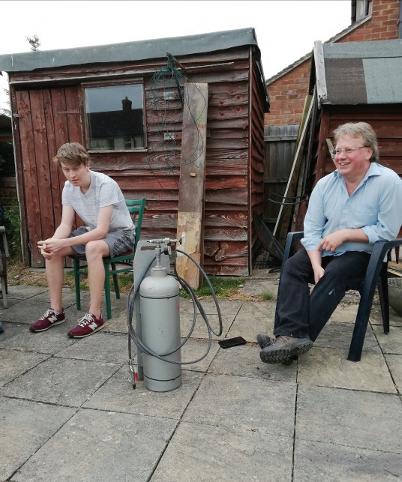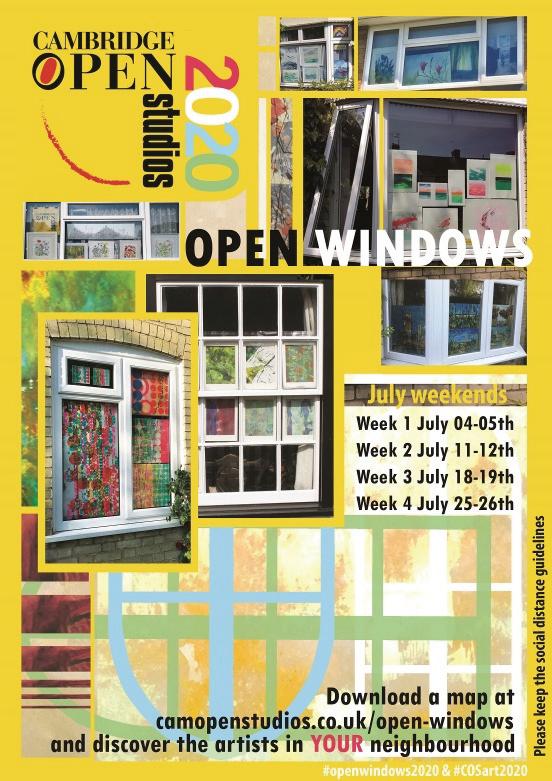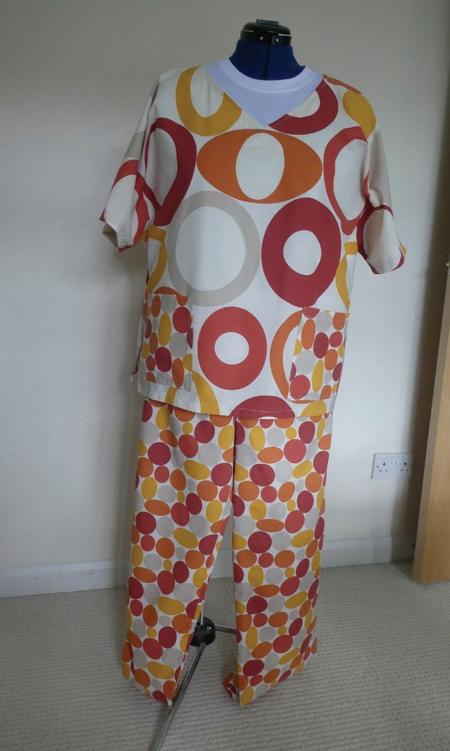
7 minute read
9
It is a long way from Meldreth to Ashkhabad: approximately 3,000 miles as the crow flies and more like 4,000 if you were crazy enough to try to make the journey by road. In fact, I’ll bet that many of you have no idea where it is, or how to find it on a The view from my office window in Ashgabat map. So, take down that old atlas, turn to the double page “The Near and Middle East”, find Iran, locate Tehran, then move north west into the Caspian Sea, then head east, into Turkmenistan, find the Koppeh Dagh and there you are in the capital, Ashkhabad, where I help run an EU-funded project designed to help the Turkmen government achieve goals in sustainable agriculture. It is 43 degrees Celsius outside and we’re four hours ahead of UK time, and sitting here in airconditioned comfort, a cold beer at hand, it strikes me that it has been a long journey for me to get here, too: all of 26 years, in fact, from the first time I went to work abroad in 1994.
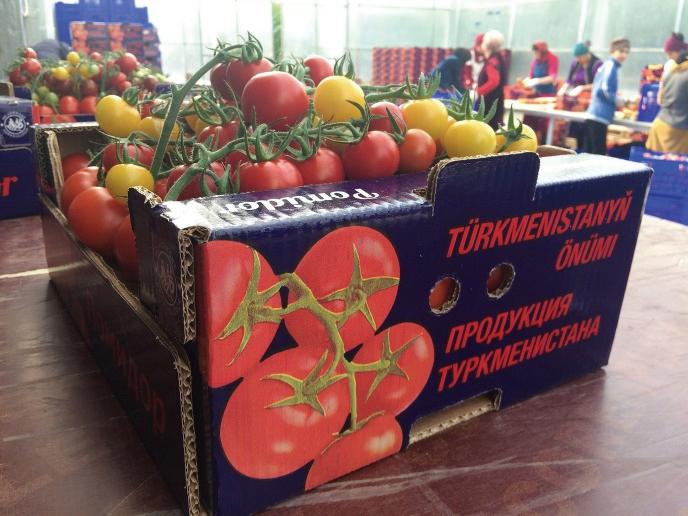
Advertisement
Growing up as a farmer’s son in Turkmen tomatoes (which are very good) Meldreth in the 1960s, at the bottom end of Brewery Lane, there was never any doubt that I was going to follow in my father’s footsteps, those of his father before him and several generations of Peppers who had tilled the land at Brewery Farm, and become a farmer myself. So I took what seemed the obvious route, studied Agriculture at Reading University and went into the industry both in research and farm management. But, even by the early 1990s, it was becoming increasingly obvious that there was no longer big money to be made in agriculture in the UK, so, with a young family to feed and clothe, in
1994 I found myself answering an advertisement for experienced staff to man a European Union-funded project restructuring the agriculture sector in Bishkek, in Kyrgyzstan. Back then, I didn’t have the faintest idea where Kyrgyzstan was, so I did what you probably did just now and got down the World Atlas to find out what I was letting myself in for. The only way in from Europe was with Lufthansa, who flew from Frankfurt to Almaty in Kazakhstan once a week then it was a five-hour drive across the mountains to Bishkek. On my first flight in, I had 40,000 USD strapped round my waist to fund the project. There were no cash machines back then and everything had to be paid for in hard currency, which in those days meant US dollars, until the Euro made life easier for all of us.
In 1995 I started working on projects in Russia and mostly drove myself around in a Russian Lada Niva 4WD. In Krasdnodar, in southern Russia, I was often stopped for speeding as the EU stickers on the vehicle were a magnet for road police, especially in order to make money on a Friday for the weekend. Myself and a colleague were invited to a Russian wedding party which began at lunchtime and was still going strong in the early hours of the following morning. Worried about driving back to my flat, I expressed concern to my host in my rudimentary Russian. He said “no problem” and handed me his card. It turned out he was head of the Krasnodar traffic police, so needless to say, I never paid another speeding fine throughout the life of the project. If stopped, I used to produce the card and say in Russian “my good friend” and usually got told by the traffic cop to clear off. I used to take an AA International Driving Licence with me before we got photo licences and made sure the AA man put lots of stamps all over it - Russians love stamps. Once, I was stopped in Stavropol by a traffic cop. He looked at the licence and said “so you can drive anything?” He wasn’t amused when I said “and tanks”.
Flying in and out of Krasnodar could sometimes be a bit of a hairraising experience, as the route to and from Frankfurt was run by an outfit called Kuban Air (who it was reputed flew the planes Aeroflot had rejected) using ancient Yak 42s. Despite the constant sense of flying by the seat of your pants, it wasn’t without its amusing moments, though. Like the occasion a colleague and I found ourselves aboard a plane on which the whole of the back half was taken up by day-old chicks, who kept up a steady “cheep, cheep” throughout the flight. Which explained why the German border guards were grinning when we got on the plane.
My next port of call was altogether more civilised. I landed in St Petersburg in 1999 and stayed for the next couple of years. The city is one of the most beautiful I have ever lived in and one I could easily settle back in again. Designed by Tsar Peter the Great and built around a network of waterways, it has gained a reputation as the “Venice of the North” and with its fine Imperial architecture (think the Hermitage museum in the old Winter Palace) and wide Soviet-era boulevards, it is somewhere everyone should visit at least once in their lives. Despite its often tragic history, being where Lenin launched the Russian Revolution and the devastating Siege of Leningrad (as it was then called) by the Nazis in the Second World War, the people retain a typically Russian sense of irony and optimism.
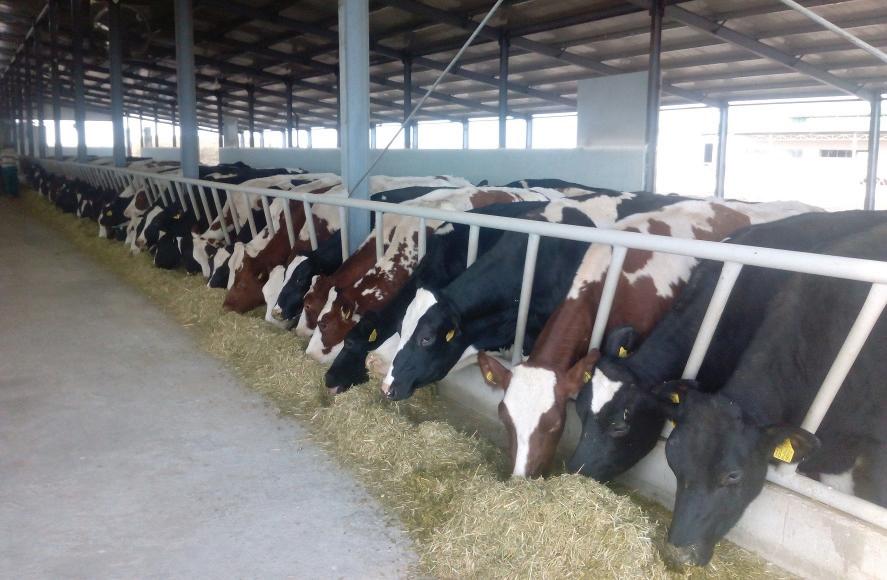
I found myself thrust into the front line on a project to promote milk 60 high merit in-calf Friesian Heifers imported from Holland with our help and meat quality – and realised early on what we were up against in trying to persuade the locals to adopt proper hygiene standards on the farm; not least, by abandoning their traditional practice of using the same barn as a milking parlour and an abattoir. One thing we tried to instil in them was the need to adopt the humane stunning of animals before slaughter, using captive bolt stun guns, which then didn’t exist in Russia. Visiting an abattoir, I innocently asked the guy in charge how they stunned the A Finnish international expert animals. I was horrified helping cheese makers
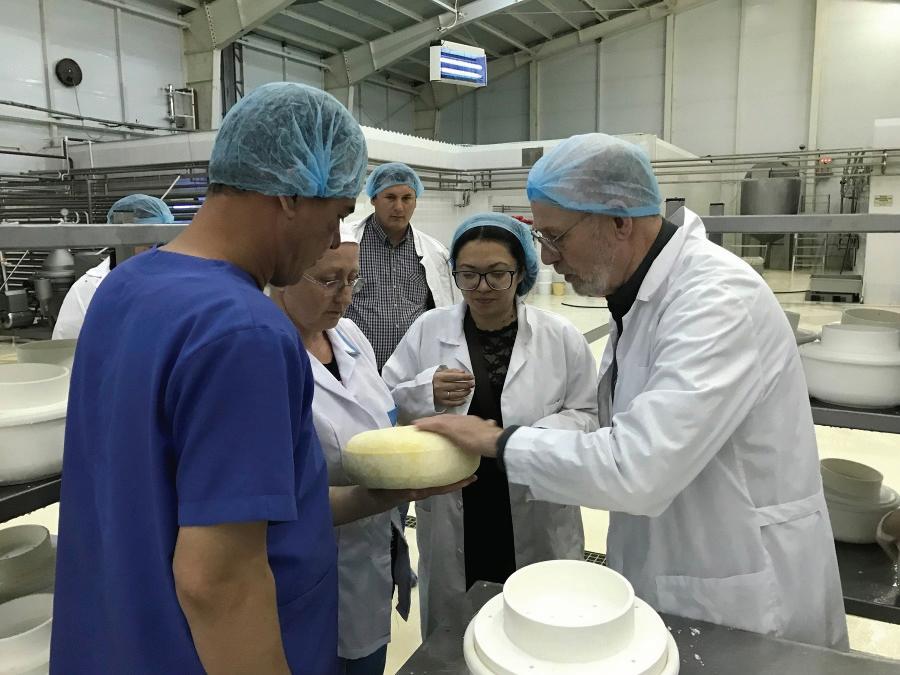
when he produced a huge cudgel, which wouldn’t have been out of place in the Flintsones. Next morning I was on the telephone to the UK stun gun manufacturers Accles and Shelvoke in Birmingham, through their agents in Helsinki, and ordered two stun guns and 10,000 rounds of ammunition. Unfortunately, when the order arrived at Pulkova airport aboard a DHL plane, it was promptly impounded. Eventually, after weeks of wrangling, we managed to negotiate its release in the time-honoured Russian fashion – by putting a crate of vodka upfront. Since then I have worked on projects in Beirut (which lasted only until I was evacuated to Cyprus by the Royal Navy when the so-called Cedar Revolution erupted after the murder of former Prime Minister Rafik Hariri by Syria), Kosovo, Lipetsk, Moscow (twice), Nizhny Novgorod, Pushkin, Tabuk (Saudi Arabia) and now, for the second time, Ashkhabad, having been here first in 2001-2003. Things have changed a lot since the first time I was here. A whole new white marble city has been built, new hotels, new sports facilities and new government ministries have all gone up. Now we can fly safely to other Turkmen cities in new Boeings instead of the ancient clapped-out Russian Ilyushins and Tupolevs. Last time I was here, we used to drive the 620 km to Turkmenabad by road across the Karakum desert, leaving at five in the morning just as it was getting light and before it got too hot. The journey took about six-and-half hours in a BMW 730. Once, we came across a car in the middle of nowhere with the roof completely flattened level with the bonnet and boot. In the road were five dead camels. It seems they tend to sit in the road at night as the tarmac is still hot from the day’s sun and get up when they hear a car coming. These poor beasts, though, had their legs cut from under them and fell on the roof. There were no survivors in the car, either. Turkmenistan survives on selling oil and gas to Russia or China, but with the sustained drop in prices exacerbated by the COVID-19 pandemic, the economy is suffering. Agriculture, which employs more than half the population, is the next largest contributor to GDP, at 17%, so our project has been quite important in improving food production and promoting the export of high value agricultural products to help offset the drop in oil and gas revenue. The project finishes at the end of this year when I think it might be about the right moment to retire – maybe …
David Pepper Ashkhabad, June 2020



